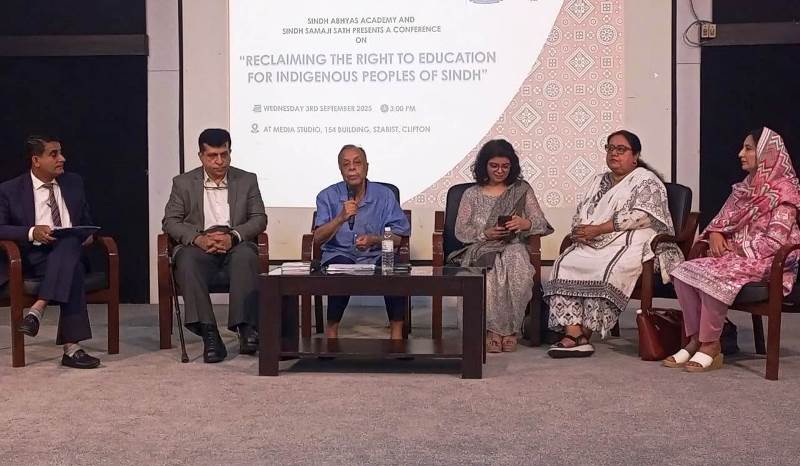KARACHI, Pakistan — In a packed hall at ZABIST University in Malir, scholars, writers, activists, and students gathered for a seminar titled “The Educational Right of the People of the Land,” jointly organized by Sindh Samaji Sath and ZABIST. The event served as a vibrant forum for intellectual and cultural dialogue, focusing on the role of education, the Sindhi language, and critical consciousness in shaping the province’s future.
Panelists including Zainab Usman Lashari, Shaherbano Kaka, Advocate Shazia Nizamani, Ejaz Qureshi, and Professor Tariq Rahim Soomro emphasized that one of the root causes of Sindh’s educational crisis is the denial of instruction in children’s mother tongue. Despite constitutional guarantees in Pakistan that every child has the right to be educated in their native language, speakers argued that state institutions have failed to implement this provision.
“If children are taught in their mother tongue, the outcomes are far more positive,” said Nizamani, calling for systemic reform. Shaherbano Kaka and Zainab Lashari spoke passionately about the cultural and cognitive importance of preserving Sindhi as a medium of instruction and identity.
The seminar also featured the launch of “Fisherfolk and Social Movements,” a new book by Ayub Shan Khaskheli, which documents the struggles of Sindh’s fishing communities and their role in broader social movements. Sami Memon joined Khaskheli in a discussion that underscored the book’s relevance to grassroots activism and public discourse.
Dr. Suleman Shaikh, in a stirring address, challenged the notion that Sindhi language holds no practical value. “Those who dismiss Sindhi forget that Shah Abdul Latif Bhittai, a globally celebrated poet, wrote in Sindhi. To understand Latif is to understand Sindh,” he said. Shaikh also expressed optimism about the rising number of Sindhi youth pursuing higher education across Karachi’s diverse neighborhoods—from Lyari to Sachal Goth.
Student activist Nafees Fatima Jafri shared her firsthand account of educational neglect in Malir, where many schools remain closed and teachers fail to fulfill their duties. “There is a complete lack of monitoring at the government level,” she said, adding that the absence of Sindhi-language instruction contributes to systemic inequality.
Professor Soomro stressed the importance of equipping students with modern scientific and technological tools while remaining rooted in their linguistic and cultural heritage. “Global competitiveness requires innovation, but identity must not be sacrificed,” he said.
The seminar concluded with remarks from Sindh Samaji Sath Chairman Ghulam Nabi Magsi, Advocate Walid Bux Narejo, and Khalil Laghari, who called on every member of society to play a role in resolving the province’s educational crisis. “Without education,” one speaker noted, “neither the individual nor society can progress.”
The event marked a rare convergence of academic rigor, cultural pride, and political urgency—underscoring that in Sindh, the fight for education is inseparable from the fight for dignity.














